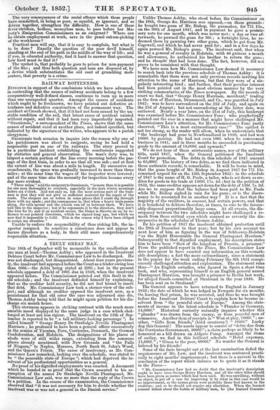RAILWAY ROTTENNESS.
EVIDENCE in support of the conclusions which we have advanced, in contending that the causes of railway accidents belong to a few comparatively well-defined classes, continues to turn up in more than one unexpected quarter. Amongst the causes of accidents which ought to be foreknown, we have pointed out defectiVe at- tendande and defective construction of the permanent way. The accident at Creech showed, that if it had not been caused by the un- stable condition of the rail, that latent cause of accident existed without repair, and that it had been very imperfectly inspected. " Oxoniensis," a correspondent of the Times, shows that the same causes of accident exist at another place, not indeed specified, but indicated by the signature of the writer, who appears to be a parish clergyman.
Oxoniensis took occasion to inquire into the reason why one of his parishioners was about to emigrate, seeing he had held a responsible post on one of the railways. The story proved to be a particular incident establishing the conclusions suggested by statistics and general observation. The man's duty was, to inspect a certain portion of the line every morning before the pas- sage of the first train, in order to see that all was safe ; and at first the extent of line was about a mile in length. By successive en- croachments, the space was gradually increased to more than three miles ; at the same time the wages of the inspector were lowered; and at the same time also the necessity for inspection became every day more evident.
" Three miles," said the emigrant to Oxoniensis, "is more than it is possible for one man thoroughly to overlook, especially in the dark winter mornings before six o'clock. And not only so, but the most serious part of the busi- ness is that they will not give us sufficient material for the repair of the roads, The sleepers are so rotten in some places that I could dig through them with my spade ; and the consequence is, that when a heavy train passes along, the rails spread and the wheels run off in between them. We have told this to the inspector ; but if he represents it to the directors, they don't like him for it; and if an accident occurs, the blame is thrown on us, by re- ference to our printed directions, which we signed long ago, but which we now find it impossible to fulfil. This is the reason why I have been obliged to resign my situation."
Unable to endure the responsibility of thus risking life, the in- spector resigned. So sensitive a conscience does not appear to harass directors as a body, in their still more comprehensively responsible situation.


























 Previous page
Previous page